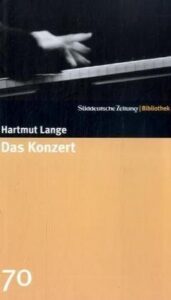Everybody who’s anybody among Berlin’s dead craves an invitation to Frau Altenshul’s salon. She has devoted her afterlife — much as she had devoted her life — to beauty, whether that was beautiful music, beautiful art, or the simple beauty of conversation among like-minded people. Max Liebermann was a painter who had lived a long life, and he is a regular visitor to the salon; more than that, he can call Frau Altenshul a friend. His indifference to the social jockeying that continued after the end of mortal life is just part of what keeps him high in her esteem. She also values his long experience, the openness of his discussion, and his passion for art.
The dead of Frau Altenshul’s salon are still attached to this world because they met their ends violently. Untimely ripped from life, they are unable or unwilling to go to their final rest. They can see the world as it is, and the world as it was at the time of their death, but as Lange depicts this afterlife they are unable to affect the material world, and they are also unable to develop themselves further. They are stuck in between. Or are they?
Liebermann and Altenshul hear that an acclaimed pianist, Rudolf Lewanski, has come to Berlin. He was a rising star of the musical world before the Nazis shot him at age 28 in the occupied Polish city of Łódź. As has become clear in the novella’s initial chapter, the visitors to Frau Altenshul’s gatherings are all Jewish, and they all perished in the Holocaust. Lewanski is a particularly unquiet ghost; since his death, he has wandered the continent, a few weeks in London, a few months in Prague, here and there, never still. Frau Altenshul tries to persuade him to stay in Berlin, saying that in the new era — the book was published in 1986 and seems to take place roughly about that time — he has nothing more to fear in the city.
Lewanski, for his part, feels the abruptness of his death quite keenly. He believes he was on the verge of an artistic breakthrough, that if he had lived longer he would have fulfilled the promise of his talent, that with more experience and more time, he would have been more than a rising star, he would have been one of the greats, doing justice to the great works that he played. He is stuck in between. Or is he? Will enough practice and a performance in Berlin be sufficient for his deliverance? If he gives a concert for the visitors to Frau Altenshul’s salon, to the wider community of those who know of her but have never been graced with an invitation, might he be their deliverance as well? Is there salvation in art?
The Concert follows the characters through their half-life, with some reminiscences on their mortal past. Lewanski has his doubts, his uncertainties, his mercurial moods. Liebermann is steady, but also doubtful. Frau Altenshul keeps up appearances. She also keeps boundaries, for the Jewish dead are not the only ones in Berlin who have not come to rest. The others are never named, but readers know who they are. One of the earliest clues is that Lange never uses Łódź when speaking of the place where Lewanski was shot; he only ever uses Litzmannstadt, the name the Nazis gave the city as they worked to erase Polish culture. There is one who periodically follows Frau Altenshul, knocks on her door, seeks entrance to her salon. She never acknowledges him, definitely does not consider admitting him, but still she knows that he is there. Others among the dead talk to their killers, seem even to have reconciled with them. The closest that Lange comes to naming these others as Nazis is when he writes of the Uniformed Ones (die Uniformierte). They, too, congregate, in a bunker in the city center that is, by implication, the Führerbunker where Hitler spent his final days. Liebermann avoids the area when he moves about the city; Lewanski, though, feels a strange pull.
Some of the Uniformed Ones would like to come to his concert, or at least to be close enough to hear. Others want Lewanski to play for them instead. Can they compel him in death as they did in life? How far does their power extend?
The Concert‘s hundred pages raise so many questions, and steadfastly refuse to answer them. It is a haunting, haunted book, and not easily left behind long after the last page has been turned.
+++
As far as I know, Das Konzert has not been published in English. That’s a shame. It’s a great book and would probably find an appreciative audience, maybe even a large one.

